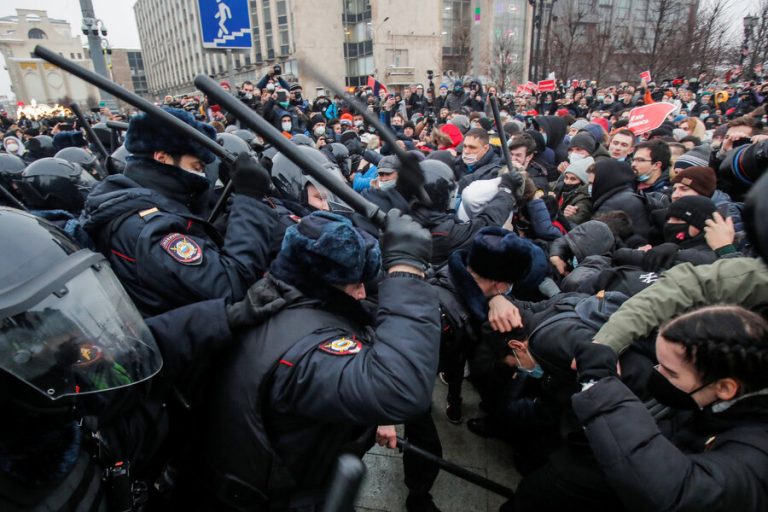“You destroyed us.”
That assessment by a senior Russian Ministry of Atomic Energy official summed up the feeling in Moscow during the immediate post-Cold War period. As Nuclear Affairs Officer at the U.S. Embassy in Moscow, I made regular visits to the Russian Ministry of Atomic Energy and nuclear facilities. With my Russian counterparts we coordinated expert and Congressional visits to the “Nuclear Cities,” the once super-secret jewels in the Soviet nuclear archipelago. Seeing those cities it was hard to disagree with him. Curtains hung in disrepair, dusty pianos sat unplayed in formerly elegant ballrooms, and the general feeling in cities like Sarov, or Arzamas-16, was one of directionlessness and despair. The lifestyle of the nuclear elite was destroyed.
After the Cold War the U.S. developed an ambitious plan to take Russia’s nuclear weapons and nuclear expertise and render it less dangerous. We had programs to safeguard nuclear materials, to upgrade security and accountability at weapons factories and nuclear repositories, programs to blend highly enriched uranium to low enriched uranium for burning in U.S. nuclear plants, and programs to encourage weapons scientists to find other, peaceful pursuits, rather than selling out to rogue countries. There were even plans to help the Nuclear Cities themselves thrive economically in a globalized world, using the scientific talent already there. One of the last vestiges of that effort was discarded when Vladimir Putin withdrew Russia from the Plutonium agreement.
The swords to plowshares effort should have been just one piece of a larger effort to put Russia back on track. But Russia never turned the corner and we did not think broadly enough. The problem was the assistance, as good as it was for U.S. security and as helpful as it was to Russian government fiscal balances, did nothing for the average Russian. It was invisible. And Public Diplomacy counts. How many Germans remember acts of kindness from American GI’s? A bar of chocolate given to a hungry child was remembered and treasured for life. We followed up with the Marshall Plan. With no visible support, Putin could create a narrative in which the West, and the U.S. in particular, wanted Russia to fail.
After the fall of the Soviet Union, the United States needed to consolidate the security gains, surely, but also do more to put Russia on the right path. How? Leadership, a plan, and public diplomacy. Easy to say now I know. We need to work on our end game to win the war, cold or hot, and then win the peace.
President Reagan was a master at crafting a narrative. “Mr. Gorbachev, tear down this wall!” But when the Soviet Union fell, after trillions in resources had been spent on both sides, the U.S. had little to say. A major policy speech by then President Bush, outlining our hopes for a Russia integrated into the world economy and welcoming Russia back to the table would have been helpful for both public audiences and could have built support for a real Marshall Plan that would have helped Russia rebuild and integrate into world institutions. Our intentions were good.
Instead, the narrative that Putin has written has been a West hostile to Russia from the start and determined to encircle it. Given the invasions of the Mongols, French, and Germans, that xenophobic mentality is in the DNA of most Russians. A Marshall Plan for Russia could have found ways to reach the average Russian by building roads, schools and hospitals. What could be more powerful than to say ‘my kid was born in the American hospital.’ Not that providing assistance was ever easy. The Russian motto seemed to be ‘We are not going to just roll over and take your money.’
At the State Department I wrote a paper for the Russia Desk urging assistance in the environment. Cleaning up a Russian river or taking on a local project would have been another visible improvement “From the American People” as USAID says. The Russia Desk sent my proposal to the assistance people, those with the money, and the idea was vehemently shot down.
So what now? We have a mix of sanctions and engagement. President Biden is off to a good start. In late January, he put President Putin on notice with frank talk about human rights, nuclear arms, Russian hacking and bounties on Americans in Afghanistan. Russia should be under no illusions with respect to American commitments to our allies and our values. At the same time, we should not give up on Russian civil society. Supporters of democracy will hear our every word on that subject and that starts with defending the rights of jailed opposition leader Alexey Navalny. We should continue to engage where we can on cooperation in space for example and other scientific endeavors and speak up where we must. It means spending political capital and real resources to engage Russia meaningfully fulltime, not just when Putin takes Russia further off track.
Russians are tremendously talented. And tenacious. With its back to the wall, Russia beat back the Nazis and survived. Tenacity is not something that the Russians need to learn. Putin will continue to push to make Russia a respected great power on his terms. But he has gone so far down the rabbit hole with respect to America that there aren’t even rabbits down there. Blaming the U.S. for Russia’s problems has worked for Putin. That’s an easier narrative than admitting that communism was a failed experiment and that the road back to being a responsible contributing member of the international community is a long and hard one. But that is the road we wanted Russia to take and ultimately the road in Russia’s best interests. We just didn’t give proper directions.
Starting a new narrative with a “reset” didn’t work either. History is history, and all we can really do now is meet each new Russia challenge on its own terms, know that Russia’s long delayed entry into the community of responsible countries is still a ways off, and be ready to really engage when Russia finds itself at a crossroads again. Putin will not last forever, and while he may have crafted a new narrative, he has not built a sustainable new system, nor one worthy of the intellect, culture, and ability of the Russian people. The U.S. has created a reservoir of goodwill among some Russians thanks to our sports, music and other cultural diplomacy programs. We shouldn’t give up on those.
As for democracy, it is not that hard. In the 1990’s Russians went to the polls, they enjoyed the free blini at the cafeteria, and they socialized and voted. It is a natural human thing. I was an observer and, yes, occasionally a husband and wife went into the booth together, but otherwise the election I saw was orderly and the atmosphere was almost festive.
I’ve seen the future of Russia in the smart questions from Russians students in universities and the brilliant contributions their scientists can make in a globalized world. We need both President Biden and President Putin to discuss a whole new paradigm and to set a course for a relationship built on respect for international norms and maximizing the potential for cooperation inherent in our two countries. We won’t win with either country feeling destroyed, only with both countries progressing in technology, human rights, and making the world better for the next generation.
Author
-

A retired Foreign Service Officer with postings in Moscow from 1997-2000 and Vladivostok as Consul General from 2007-2010.
View all posts




